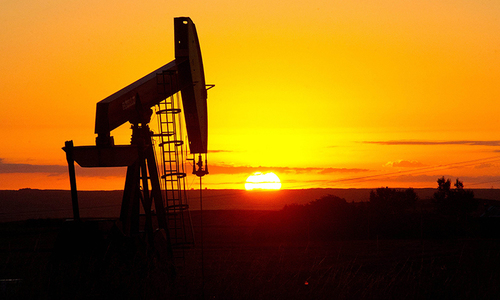WHEN the two most powerful men in the energy world — Prince Mohammad bin Salman (MBS) of Saudi Arabia and President Vladimir Putin of Russia — sit down to talk, energy has to be the key point on the agenda. And so it was in Riyadh last week.
The bonhomie between the two in recent years, paving the way for closer cooperation in the crude sector, was unimaginable until recently. History was standing in between. During the cold war era, Russia and Saudi Arabia were seen as competitors in the energy world too.
Saudi Arabia during the mid-80s was also blamed for planning the collapse of the oil markets at the behest of the Reagan administration. Unable to finance the ongoing Afghan war then, the move contributed significantly to the ultimate meltdown of the then USSR, old-timers underline.
But then there are no permanent foes in international relations. With the US interest in the region receding, Riyadh needed to look around for security. Russia represented an option.
‘Crude’ compulsions also helped bring the two closer. In the changed global crude scenario, Saudi Arabia was no more in the position to influence the global oil markets alone. It needed support from Russia to help stabilise the oil markets.
Former Saudi oil minister Ali Al-Naimi says in his memoirs that in 2009 and in 2014, when the markets were faced with turmoil, he did try to bring Russia on board with the Organisation of Petroleum Countries (Opec). Moscow always promised but never delivered, Naimi underlined in his memoirs. This made Naimi, the old guard, turn sceptical of the very sincerity of Russia.
But things started to change once MBS took over. Ali Al- Naimi was sidelined and so was his baggage and a new beginning was made with Moscow. The two began getting closer.
Deepening ties have seen non-Opec Russia, the one-time rival in oil markets, join Opec kingpin Saudi Arabia in forming an alliance commonly known as Opec+ to support crude prices by restraining output. And unlike in the past, the deal continues to work.
Moscow and Riyadh also appear well-intentioned and determined to continue with the deal and ensure the stability of the oil markets in the future by managing the supply side of the global crude equation.
Showing a convergence of interest, just a couple of weeks before the visit to Riyadh, President Putin spoke of the need to decrease oil stockpiles to “reasonable levels” so that they “don’t put pressure on prices.”
That was music to Saudi ears. “I very much like the words of President Putin. He understands we need to take steps to prevent turmoil in the market. We need to take some additional steps to ensure the stockpiles are back to normal but let’s see what we come up to (at the upcoming Opec+ meeting) in December,” Saudi energy minister Abdulaziz bin Salman told the press then.
With the stability of the oil markets, a key objective of both the countries during the visit of President Putin, Saudi Arabia, and Russia signed a key deal to bolster cooperation among the Opec+ countries. The deal seeks to “reinforce cooperation... and strengthen oil market stability,” Saudi energy minister said at the signing ceremony.
President Putin said: “Russia attaches particular importance to the development of friendly, and mutually beneficial ties with Saudi Arabia”.
Earlier, Kremlin spokesman Dmitry Peskov said President Putin had discussed oil prices with Saudi King Salman and the crown prince. “A substantial exchange of opinions took place, on regional problems, on the situation at the energy markets, or on oil prices, to keep it simple,” he told reporters in Riyadh.
More than 30 agreements, worth billions of dollars, covering both energy and non-energy sectors were signed in Riyadh during the visit. Russian Energy Minister Alexander Novak hinted in Riyadh; Russia’s Gazprom was interested in cooperating with Saudi firms on natural gas. Krill Dmitriev, the head of the Russian Direct Investment Fund said Russian investors were also interested in the planned Aramco IPO.
Saudi Arabia and Russia have made joint strategic moves on the global energy chessboard. While they have managed to put a floor under the global oil markets, their efforts have not helped to move the markets much higher. With fears of global demand faltering, the trade war between China and the US a real possibility and a global recession just around the corner, Russia and Saudi have a tough task in hand.
Would they succeed, seems difficult, if not impossible.
Published in Dawn, October 20th, 2019














































